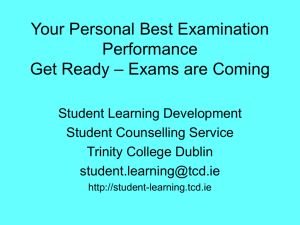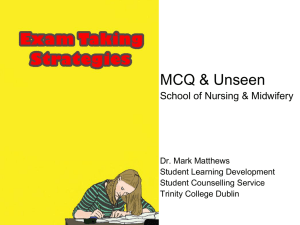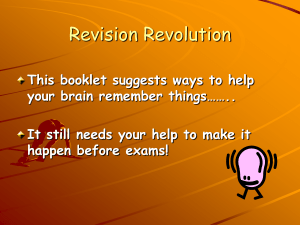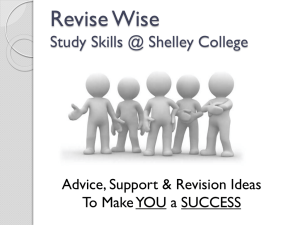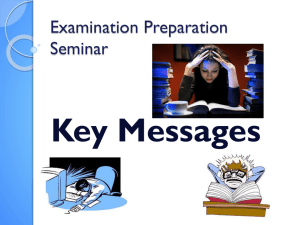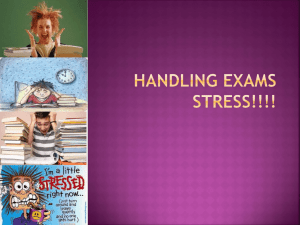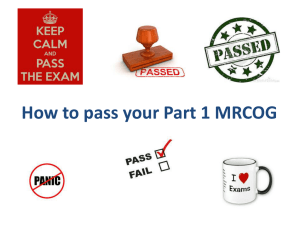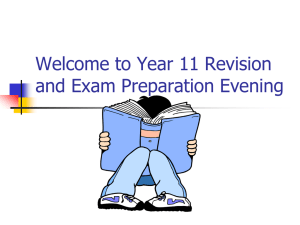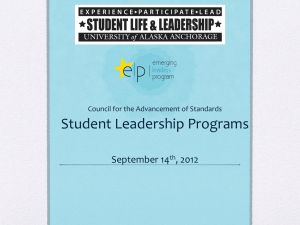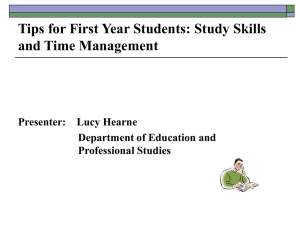Preparation for your Personal Best
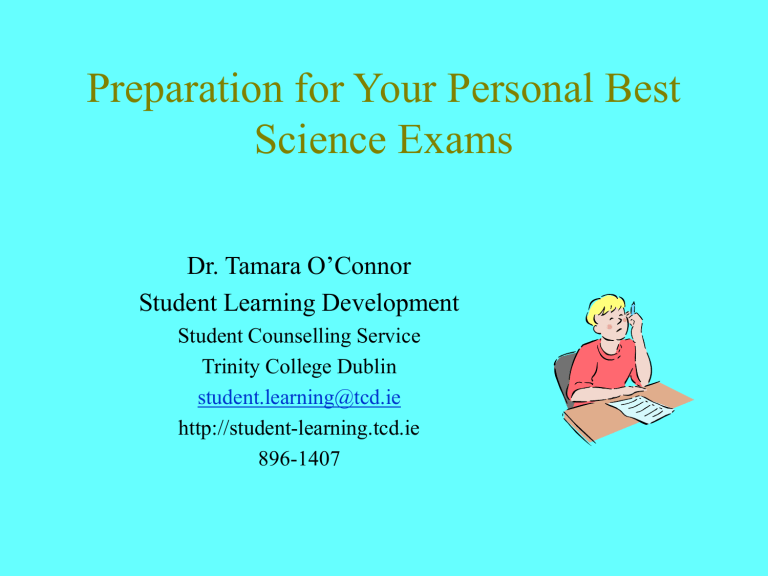
Preparation for Your Personal Best
Science Exams
Dr. Tamara O’Connor
Student Learning Development
Student Counselling Service
Trinity College Dublin student.learning@tcd.ie
http://student-learning.tcd.ie
896-1407
Objectives
• Explore a framework for managing exams
• Learn about active examination preparation strategies
• Rehearse performance at your personal best – exam taking strategies for science & problemsolving exams
Examinations As an Event
• Sport
– Skills development
– Fitness training
• Strength
• Stamina
– Performance rehearsal
• Academic performance
– Learning new material
– Revision
• Understanding
• Memory
– Performance rehearsal
Personal Best Performance
By managing:
• Planning = Game Plan
• Revision = Fitness training
• Practice = Performance Rehearsal
• Exam Taking = Performance Event
• Performance Anxiety
Game Plan - Preparation
• Know yourself
• Familiarise yourself with exam
• What topics to revise?
• Skim all materials to determine what to cover
• Overview work to be done & schedule time to do it
Know Yourself
• What are your exam concerns? Why?
• What do you do well?
• What could you do better?
• How do you study?
• What strategies do you use to prepare?
• How do you manage your stress?
Learn from the past
• Get detailed information about what your exam paper looks like
• Identify and revise topics you do not know well
• What works for you?
Organise an Active Revision Program
• Know your learning styles
• Make revision fun
– Use revision strategies where you move around
– Draw pictures, maps, cartoons, diagrams, etc
– Put key points around your walls
– Teach “someone” else and ask them key questions (answer the questions yourself)
– Listen to tapes or view video/DVD versions of the material
• Make exam preparation a social occasion
Revision – Fitness Training
MCQ Exams recognition & accurate knowledge
Short Answer knowledge & understanding key ideas/facts at basic level
Thus for revision:
• Think vocabulary, words, terms, concepts, systems
• Make flash cards & test yourself
• Recite for precision
• Verbal & visual strategies to check mastery
• Create summary sheets, diagrams, charts, tables, mind maps
Go! Conditioned Reflex –
MCQ Practice
• Read each question carefully
• Circle key words or negatives
• Identify modifiers and qualifiers (e.g. only, never, sometimes)
• Read all options before making choice
• Anticipate answer before looking at options
• Check before marking answer
The following are all bones of the skull except: a. Parietal bone b. Temporal bone c. Tarsal bone d. Frontal bone
The function of dendrites is to:
a. slow down nerve impulses b. provide myelin coating for nerve c. synthesize neurotransmitters d. pick up nerve signals
Go! Conditioned Reflex –
Short Answer Practice
• Deconstruct the question
• Think in own words
• Find and use key words
• Show what you know: Define key words, concepts, theories
• Complete sentences
• Stay relevant
Outline the structure of fats OR carbohydrates
• Choose question
• What are they looking for?
• How would I answer this?
• How would I revise in order to be able to answer this?
• Practice answering this type of question, varying topic
Outline and briefly discuss the three main approaches to understanding and defining stress
• Stress – what is it?
• 3 main theories
• Compare & contrast – definitions, causes, etc.
• Examples
Revision – Problem solving
• Use active learning strategies
• Develop a range of strategies
– Compare textbook & notes
– Similarities & differences between problem types & solution methods
– How apply different situations or data
– Try to solve the problem as far as possible
Revision – Problem solving
• Practise problem-solving without your notes!
• Work with others
• Work problems ‘out of context’
Rehearse performing at your personal best
• Practice by anticipating questions
• Practice by answering old exam Q
• Mark your own answers
• Practice – un-timed and timed
• Simulate exam conditions
Simulating Exam Conditions
• The key to both intellectual and emotional preparation for exams is simulation
• The closer a simulation is to the actual event, the more likely it is that preparation will be effective
• A simulation engages both intellectual and emotional responses
Rehearse Techniques for Personal
Best Performance
• Visit the exam venue and get comfortable in it
• Use photos, sketches, etc to bring the exam venue into your study space
• Mentally place yourself in the exam venue when you are rehearsing
Visualisation
• Every athlete’s PB is in their mind
• Visualisation is a vital part of performance preparation
• Only ever visualise performing at your best
Keys to Your Personal Best
• Game Planning
– Organisation
– Learn from the past
• Fitness training using active revision strategies
• Performance rehearsal using practice and simulation
• Emotional and Intellectual preparation
